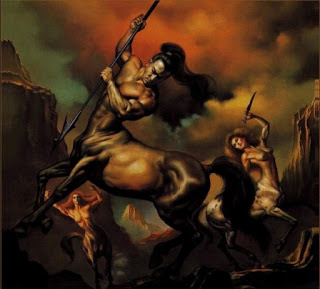Chiron
In Greek mythology, Chiron was held to be the superlative centaur amongst his brethren. Chiron was notable throughout Greek mythology for his youth-nurturing nature. His personal skills tend to match those of Apollo, his foster father (sometimes along with Artemis); medicine, music, archery, hunting, prophecy. His parents were Cronus and Philyra.
Like the satyrs, centaurs were notorious for being wild and lusty, overly indulgent drinkers and carousers, given to violence when intoxicated, and generally uncultured delinquents. Chiron, by contrast, was intelligent, civilized and kind, but he was not related directly to the other centaurs. He was known for his knowledge and skill with medicine.
According to an archaic myth he was sired by the Titan Cronus when he had taken the form of a horse and impregnated the nymph Philyra. Chiron's lineage was different from other centaurs, who were born of sun and raincloud, rendered by Greeks of the Classic period as from the union of the king Ixion, consigned to a fiery wheel, and Nephele ("cloud"), which in the Olympian telling Zeus invented to look like Hera. Myths in the Olympian tradition attributed Chiron's uniquely peaceful character and intelligence to teaching by Apollo and Artemis in his younger days.
Some sources speculate that Chiron was originally a Thessalian god, later subsumed into the Greek pantheon as a centaur.
Chiron lived predominantly on Mount Pelion; there he married the nymph Chariclo who bore him three daughters, Hippe (also known as Melanippe (also the name of her daughter), the "Black Mare" or Euippe, "truly a mare"), Endeis, and Ocyrhoe, and one son Carystus.
A great healer, astrologer, and respected oracle, Chiron was said to be the first among centaurs and highly revered as a teacher and tutor. Among his pupils were many culture heroes: Asclepius, Aristaeus, Ajax, Aeneas, Actaeon, Caeneus, Theseus, Achilles, Jason, Peleus, Telamon, Perseus, sometimes Heracles, Oileus, Phoenix, and in one Byzantine tradition, even Dionysus: according to Ptolemaeus Chennus of Alexandria, "Dionysus was loved by Chiron, from whom he learned chants and dances, the bacchic rites and initiations".
There is also a persistent link with Peleus throughout Chiron's myth. Chiron saved the life of Peleus when Acastus tried to kill him by taking his sword and leaving him out in the woods to be slaughtered by the centaurs. Chiron retrieved the sword for Peleus. Chiron then explained to Peleus how to capture the nymph Thetis, leading to their marriage.
Death
His nobility is further reflected in the story of his death, as Prometheus sacrificed his life, allowing mankind to obtain the use of fire. Being the son of Cronus, he was immortal and so could not die. So it was left to Heracles to arrange a bargain with Zeus to exchange Chiron's immortality for the life of Prometheus, who had been chained to a rock and left to die for his transgressions. Chiron had been poisoned with an arrow belonging to Heracles that had been treated with the blood of the Hydra, or, in other versions, poison that Chiron had given to the hero when he had been under the honorable centaur's tutelage.
According to a Scholium on Theocritus, this had taken place during the visit of Heracles to the cave of Pholus on Mount Pelion in Thessaly when he visited his friend during his fourth labour in defeating the Erymanthian Boar. While they were at supper, Heracles asked for some wine to accompany his meal. Pholus, who ate his food raw, was taken aback. He had been given a vessel of sacred wine by Dionysus sometime earlier, to be kept in trust for the rest of the centaurs until the right time for its opening. At Heracles' prompting, Pholus was forced to produce the vessel of sacred wine.
The hero, gasping for wine, grabbed it from him and forced it open. Thereupon the vapors of the sacred wine wafted out of the cave and intoxicated the wild centaurs, led by Nessus, who had gathered outside. They attacked the cave with stones and fir trees. Heracles was forced to shoot many arrows (poisoned with the blood of the Hydra) to drive them back. During this assault, Chiron was hit in the thigh by one of the poisoned arrows. After the centaurs had fled, Pholus emerged from the cave to observe the destruction.
Being of a philosophical frame of mind, he pulled one of the arrows from the body of a dead centaur and wondered how such a little thing as an arrow could have caused so much death and destruction. In that instant, he let slip the arrow from his hand and it dropped and hit him in the hoof, killing him instantly. This, however, is open to controversy, because Pholus shared the "civilized centaur" form with Chiron in some art images, and thus would have been immortal.
Ironically, Chiron, the master of the healing arts, could not heal himself. So he willingly gave up his immortality. He was honored with a place in the sky, identified by the Greeks as the constellation Centaurus.
In Ovid's poem Fasti Ovid has the hero Hercules visiting Chiron's home on Pelion while Achilles, still a child is there. While Chiron is examining Hercules' weapons, one of the arrows dipped in Lernaean hydra venom falls on Chiron's left foot and poisons him. Chiron then tries to use herbs to heal himself, but fails. After nine days with a weeping Achilles looking on, Chiron passes into the stars. Chiron was made a promise by Zeus that as long as he was needed as a trainer of demigods, He may exist in this world, He is among us today as not just a constellation but an inspiration.
While the old man fingers the foul, poisoned shafts,
An arrow slips out and stabs his left foot.
Chiron groaned and hauled the iron from his flesh (5.397-99)











